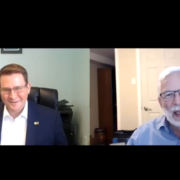Can I Still Get An Online Collaborative Divorce?
Here in Florida, the court systems have largely reopened, and even though we are facing a surge in the Delta variant of the Coronavirus, things in many ways feel like we have gotten back to normal. And yet, many people are still not comfortable having their most private details revealed in public divorce court battles or even meeting in person to resolve disputes outside of court. So is Online Collaborative Divorce still an option?
Fortunately, the answer is yes, you can still resolve divorce and other family law matters amicably and without leaving your home.
What is Collaborative Divorce?
Collaborative Divorce starts with a simple concept. Both you and your spouse have separate, independent Collaborative Lawyers. Collaborative Lawyers are there solely for the purpose of reaching an agreement and cannot be used to fight in court. This means that no time, no money, and no energy is spent on opposition research or preparing for nasty court battles. The Collaborative Lawyers are unlike traditional adversarial lawyers; their mandate is to help you reach an amicable resolution so that you can move forward with your life. If, for whatever reason, either of you decide that you no longer want to use Online Collaborative Divorce, Collaborative Lawyers are disqualified from engaging in litigation. Fortunately, in my experience, that is pretty rare, as only about 7% of my Collaborative Divorce cases have terminated without an agreement.
Oftentimes, there are additional resources available in a Collaborative Divorce, such as a Facilitator to work directly with parents on reaching a tailored parenting plan and help resolve communication issues as they arise (which, in a divorce, they inevitably will). Many times, a Neutral Financial Professional is also engaged to ensure that both you and your spouse have sufficient understanding of your marital estate so you can more quickly make informed decisions.
Online Collaborative Divorce
In traditional Collaborative Divorce, you and your spouse resolve issues through a series of meetings in professionals’ conference rooms. In this structured process, you will go through the 4 D’s of Resolution:
- Decide to enter into the Collaborative Process
- Disclose all relevant financial and other information
- Develop options as potential solutions for your family
- Determine the best outcomes for you and your family
In Online Collaborative Divorce, we hold these meetings, but rather than gather in-person we use videoconferencing software. Generally, we utilize Zoom so that you, your spouse, and the rest of the team can meet together virtually. All you need to participate is a webcam and microphone or smartphone. If you are not technically savvy, no worries! At Family Diplomacy, my staff and I will work with you to make sure you are set up and ready for meetings.
The great thing about working through Zoom is that, if, at any time during full team meetings you need to speak privately with your attorney, a separate breakout room can be created. This ensures that you can receive privileged, independent legal advice.
Once you and your spouse have reached an agreement, the agreement may be notarized online. We can then file a case in a Florida county that waves any requirement for you or your spouse to physically appear at court (and many counties are still allowing uncontested final hearings — where an agreement is already reached — to be conducted via Zoom).
How to Get Started
If you are ready to learn more about Online Collaborative Divorce or any other family law options, we welcome you to contact us to discuss your situation.
Adam B. Cordover is a Collaborative Lawyer with offices in Tampa, St. Petersburg, and Sarasota. He is a member of the Board of the International Academy of Collaborative Professionals and he trains judges, general magistrates, attorneys, mental health professionals, and financial professionals in the Collaborative Divorce process as an alternative to divorce court battles. Adam is co-author with Forrest S. Mosten of an American Bar Association book on Building a Successful Collaborative Family Law Practice.






